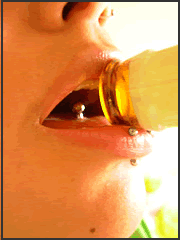Prospective memory is an important aspect of day-to-day memory function and is defined as the cognitive ability to remember to carry out an activity at some future point in time. Examples include remembering to attend an appointment at the dentist or to carry out a task such as remembering to pay a bill on time. [continue reading…]
Adolescent Health
An African study has found a link between a difficult childhood and alcohol consumption as a teenager. Researchers writing in BioMed Central’s open access journal Child and Adolescent Psychiatry and Mental Health studied the association between adverse childhood experiences and drunkenness among 9,189 adolescents aged 12-19 years living in Burkina Faso, Ghana, Malawi, and Uganda. [continue reading…]
Study also finds that severe sleep deprivation during the school week is common among high-school seniors
 High school seniors with excessive daytime sleepiness have an elevated risk for depression, suggests a research abstract that will be presented Wednesday, June 9, 2010, in San Antonio, Texas, at SLEEP 2010, the 24th annual meeting of the Associated Professional Sleep Societies LLC.
High school seniors with excessive daytime sleepiness have an elevated risk for depression, suggests a research abstract that will be presented Wednesday, June 9, 2010, in San Antonio, Texas, at SLEEP 2010, the 24th annual meeting of the Associated Professional Sleep Societies LLC.
Results indicate that high school seniors were three times more likely to have strong depression symptoms (odds ratio = 3.04) if they had excessive daytime sleepiness. Fifty-two percent of participants (136 students) had excessive daytime sleepiness, 30 percent (80 students) had strong depression symptoms and 32 percent (82 students) had some symptoms of depression.

istockphoto
Why do teenagers find learning a drag? Jessica Hamzelou helps us to understand why in today’s New Scientist
Being a teenager can be a drag. As if dealing with peer pressure and raging hormones weren’t hard enough, your ability to learn new things is also reduced. Now the brain molecules behind this learning deficit have been identified in mice – and blocked.
When children hit puberty, their ability to learn a second language drops, they find it harder to learn their way around a new location and they are worse at detecting errors in cognitive tests.
Why is this? Sheryl Smith and her colleagues at the State University of New York now reckon that all of these behavioural changes could be due to a temporary increase in a chemical receptor that inhibits brain activity in an area responsible for learning.Link to read full article
Source:New Scientist


